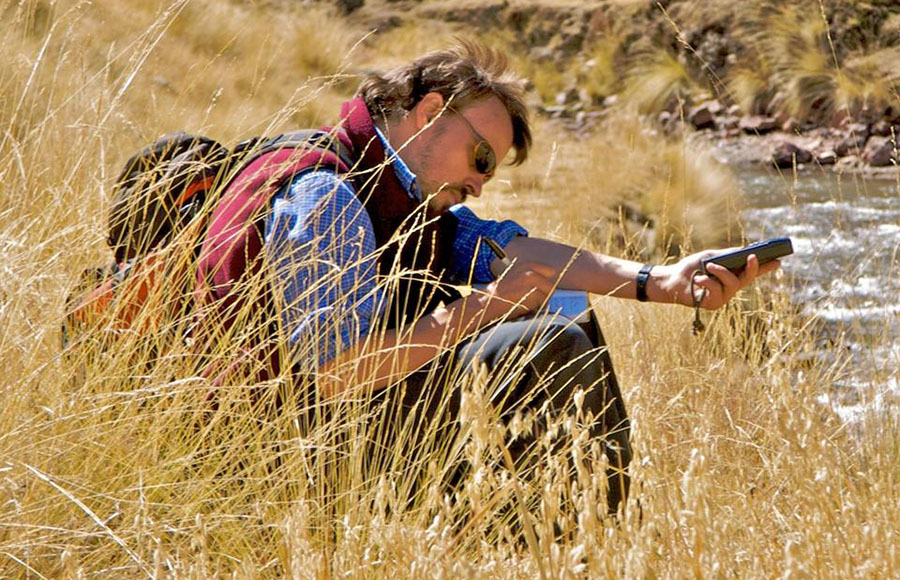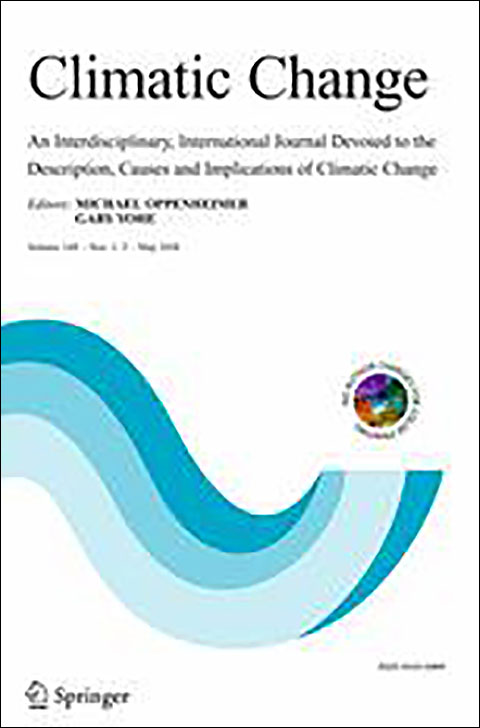
Dr. Anton Seimon, research assistant professor in Appalachian’s Department of Geography and Planning, performs fieldwork. He is co-author of the article “Climate change, population, and poverty: vulnerability and exposure to heat stress in countries bordering the Great Lakes of Africa,” which recently appeared in the the journal Climatic Change. Photo submitted

The journal Climatic Change (Volume 148) features an article co-authored by Dr. Anton Seimon, a climate scientist at Appalachian. The article examines the daunting levels of heat stress East African nations will face by the end of the 21st century as human-caused climate change intensifies. Link.springer.com image
BOONE, N.C. — A new study co-authored by Dr. Anton Seimon, a climate scientist in Appalachian State University’s Department of Geography and Planning, shows residents of East African nations face daunting levels of heat stress by late 21st century as human-caused climate change intensifies.
The study, titled “Climate change, population, and poverty: vulnerability and exposure to heat stress in countries bordering the Great Lakes of Africa,” appears in the journal Climatic Change (Volume 148, 2018).

The journal Climatic Change (Volume 148) features an article co-authored by Dr. Anton Seimon, a climate scientist at Appalachian. The article examines the daunting levels of heat stress East African nations will face by the end of the 21st century as human-caused climate change intensifies. Link.springer.com image
Seimon said heat stress combines temperature, relative humidity and wind speed to represent how atmospheric conditions in hot climates can affect humans and other species, providing a more realistic measure than temperature alone.
Dr. Salvi Asefi-Najafabady, a researcher in the University of Virginia’s Department of Environmental Sciences who led the investigation, said the living conditions for hundreds of millions of regional inhabitants will become unbearable in the coming decades. “People living in already warm climates will have to endure increasingly intolerable conditions, therefore the need to take action for serious adaptation planning is urgent,” she said.
Asefi-Najafabady said the study emphasizes the severity of the impact on more populated and economically vulnerable areas, whereas “under lower population and better economic conditions, adaptation planning for severe climate impacts is more plausible.”
Seimon and Asefi-Najafabady worked with fellow co-authors Dr. Deborah Lawrence, professor in the Department of Environmental Sciences at the University of Virginia, and Dr. Peter Lawrence, an environmental modeler at the National Center for Atmospheric Research (NCAR). The team used sophisticated climate modeling tools that predict future states of the atmosphere, land surface and human activity to generate scenarios to understand the potential impacts of climate change.
Deborah Lawrence said, “Earth system models give us a sense for the scope and magnitude of the problems we face. We looked at where heat stress will occur and compared it with where people are likely to be. For example, over 70 million people in Uganda and Kenya currently experience 20-25 days of dangerous heat per year; in 2090 it could be more than 125 days with far more people at risk.”
The world’s warming climate is only one of the causes of the increasing stress to tropical Africa’s residents, she said. “This region is one of the most impoverished, limiting the ability of the people to take proactive steps to adapt to extreme heat.”
With funding from the MacArthur Foundation, the team applies the Community Earth System Model (CESM), developed at NCAR, to address the critical knowledge gaps that hinder both human adaptation and wildlife conservation planning. For the heat stress study, they examined late-century predictions generated under expected high global greenhouse gas emissions and continued land-use change. They also considered how outcomes would diverge under different socioeconomic conditions as the largely rural populations gravitate toward urban areas over time as their economies develop.
Describing how advances at NCAR and other institutes have made this type of analysis possible, Peter Lawrence stated, “Detailed regional studies from Earth System Modeling provide a much-needed assessment of the impacts of the global climate scenarios that have been developed by modeling centers from around the world.
“Working with the group has allowed for a level of understanding and guidance for the people and ecosystems of the East African region that would not be possible from the work of the IPCC (Intergovernmental Panel on Climate Change) assessment process alone. This work is invaluable in assessing how we develop and use global Earth System Models to address the pressing impacts of future climate change, conservation management and human development in the East African region.”
Seimon, who has studied climate change impacts across East Africa over the past decade, said the findings illustrate the disruption that industrial economies and land conversions worldwide have caused to the region’s future prospects for habitability. He added, with cautious optimism, “In this dismal message lies an opportunity for clear communication about the absolute necessity for meaningful action on climate change in the present, including local and global mitigation measures that could lessen the severity of the types of outcomes shown in our study.”
About the Department of Geography and Planning
The Department of Geography and Planning promotes the understanding of the spatial dimensions of human behavior within the physical and cultural systems of the earth, and the role of planning in achieving improvement in those systems. The department offers degrees in geography and in community and regional planning. Learn more at https://geo.appstate.edu.
About Appalachian State University
As a premier public institution, Appalachian State University prepares students to lead purposeful lives. App State is one of 17 campuses in the University of North Carolina System, with a national reputation for innovative teaching and opening access to a high-quality, cost-effective education. The university enrolls more than 21,000 students, has a low student-to-faculty ratio and offers more than 150 undergraduate and 80 graduate majors at its Boone and Hickory campuses and through App State Online. Learn more at https://www.appstate.edu.
What do you think?
Share your feedback on this story.











